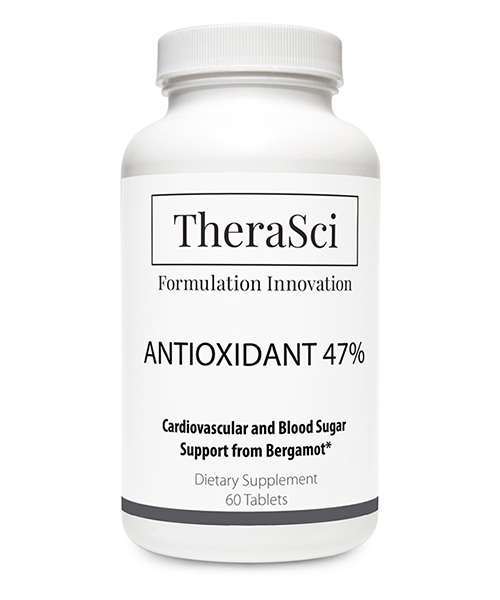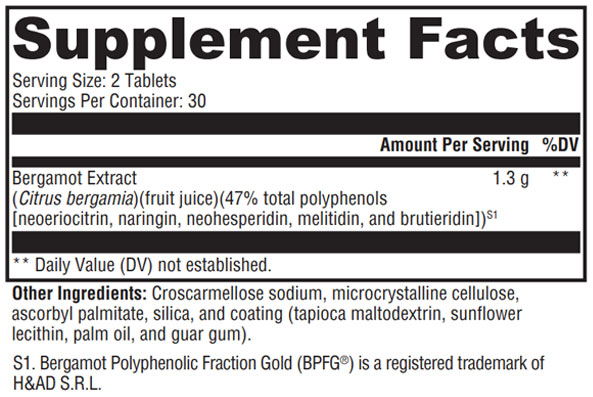Antioxidant 47%

Clinical Applications
- Supports Cardiovascular Health*
- Helps Maintain Healthy Cholesterol Levels Already Within Normal Range*
- Supports Healthy Blood Glucose Metabolism*
Antioxidant 47% features a highly concentrated source of polyphenolic antioxidants derived from bergamot (Citrus bergamia), a flavonoid-rich fruit originating from the Calabria region in southern Italy and traditionally used to support cardiovascular wellness. Research has suggested that bergamot juice extract is utilized hepatically to help maintain healthy cholesterol levels already within normal range and to support healthy blood glucose metabolism.
All TheraSci, LLC Formulas Meet or Exceed cGMP Quality Standards
Discussion
Antioxidant 47% features Bergamot Polyphenolic Fraction Gold® (BPFG®), a concentrated bergamot juice extract containing a unique combination of naturally occurring polyphenolic components that exhibit antioxidant activity. These protective flavonoids include neoeriocitrin, naringin, neohesperidin, melitidin, and brutieridin, each of which influences a slightly different and distinctive molecular pathway.*
The following focuses on the mechanisms proposed to be responsible for the beneficial cardioprotective effects of bergamot, which include the maintenance of healthy lipid and blood glucose levels and the support of normal resistance to oxidative stress.*[1,2]
Mechanism of Action
Reviews of the mechanism of action and influence of bergamot juice extract on lipid and sugar metabolism at the molecular level suggest that naringin and neohesperidin initiate the release of adenosine monophosphate-activated protein kinase (AMPK), a central regulator of glucose and fatty acid metabolism. Neoeriocitrin is proposed to inhibit phosphodiesterases (PDEs), which are involved in the regulation of energy metabolism and lipolysis through the cyclic adenosine monophosphate (cAMP) molecular pathway. It is submitted that brutieridin and melitidin act as direct hydroxymethylglutaryl coenzyme A (HMG-CoA) reductase inhibitors involved in deterring cholesterol synthesis in the liver. Bergamot flavonoids have also been found to inhibit quinone oxidoreductase 2 (QR2), an enzyme implicated in catalyzing oxidation-reduction reactions involving xenobiotic (foreign) and biogenic (produced in the body) substrates. Preliminary data suggests that QR2 enzyme activity contributes to the effects observed in lipid and glucose metabolism. Although the individual polyphenolic compounds in bergamot juice extract do appear to exert specific effects, the authors propose that the synergistic effects from collectively influencing multiple molecular pathways are what ultimately benefit cardiovascular health.*[1,3]
Cardiovascular and Blood Sugar Support
Numerous clinical trials have suggested that bergamot juice extract functions via metabolic pathways in the liver to maintain healthy cholesterol levels and to support healthy blood glucose metabolism.[4,5] There is a limited amount of data assessing the use of supplemental bergamot juice extract in generally healthy subjects; however, there are studies in athletes. A randomized, double-blind, placebo-controlled study evaluated the effect of BPFG on cardiovascular parameters and exercise performance in male cyclists (n = 30) utilizing 650 mg of BPFG twice per day for four weeks. Significant differences were observed between pre-and post-intervention baseline endothelial NO (nitric oxide) levels, suggesting that BPFG plays a role in cardiovascular adaptive mechanisms by way of a vasoprotective response.*[6]
Follow-up trials with healthy populations are needed to solidify the traditional use of bergamot extract for cardiovascular wellness and to further validate the role of bergamot supplements in the clinical setting.*

Directions
Consult your healthcare practitioner prior to use. Individuals taking medication should discuss potential interactions with their
healthcare practitioner. Do not use if tamper seal is damaged.
Formulated To Exclude
genetically modified organisms (GMOs), artificial colors, artificial sweeteners, and artificial preservatives.
References
1. Janda E, Lascala A, Martino C, et al. PharmaNutrition. 2016 Oct;4(suppl): S8-S18. doi:10.1016/j.phanu.2016.05.001.
2. Testai L, Calderone V. Nutrients. 2017 May 16:9(5):502. doi:10.3390/nu9050502.
3. Walker R, Janda E, Mollace V. In: Watson RR et al, eds. Polyphenols in Human Health and Disease. Elsevier Inc; 2014:chap 84. doi:10.1016/B978-0-12-398456-2.00084-0.
4. Mannucci C, Navarra M, Calapai F, et al. Phytother Res. 2017 Jan;31(1):27-39. doi:10.1002/ptr.5734.
5. Lamiquiz-Moneo I, Giné-González J, Alisente S, et al. Crit Rev Food Sci Nutr. 2019 Oct 31:1-11. doi:10.1080/10408398.2019.1677554.
6. Mollace R, Gliozzi M, Tavernese A, et al. J Sports Med Ther. 2018;3(2):053-061. doi:10.29328/journal.jsmt.1001027.
*These statements have not been evaluated by the Food and Drug Administration. This product is not intended to diagnose, treat, cure, or prevent any disease.
